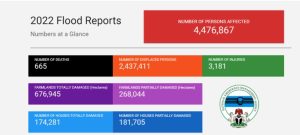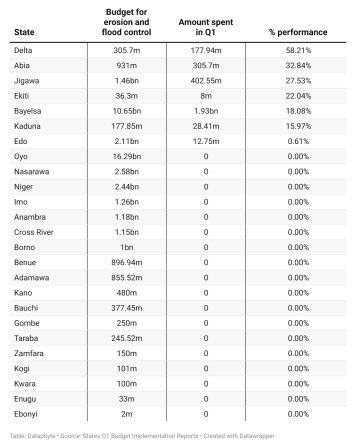Despite proactive preparations for potential floods in 2023, an alarming number of Nigerian states have failed to prioritize the implementation of crucial flood and erosion control projects, leaving them alarmingly vulnerable to the devastating impact of this year’s impending flood.
The destructive flood that hit Nigeria in 2022 had catastrophic consequences, leading to 665 deaths, displacing over two million Nigerians, and causing trillions of Naira worth of property damage.
The agriculture and construction sectors were among the most vulnerable, with substantial financial losses, which experts estimated at over N4.2 trillion.
Despite the alarming forecast for this year by the Nigeria Meteorological Agency (NiMET) and the lessons from the previous year, some states have yet to undertake flood and erosion control projects, as Dataphyte’s review of the budget implementation reports indicated.

Although many states had allocated funds for flood and erosion control in their 2023 budgets, the review of their Budget Implementation Reports revealed that several states did not initiate any such projects during the first quarter.
State governments also bear a significant responsibility in mitigating the impact of floods, but despite allocating funds for flood and erosion control projects in their 2023 budgets, many states failed to implement these projects in the first quarter, including those at high risk of floods like Akwa-Ibom, Cross Rivers and Rivers states.
“Starting in March, coastal areas in the South-South, particularly Bayelsa, Akwa Ibom, and Rivers State, will experience downpours; Southern Inland cities will see precipitation in April, while central states will see rain in May”, the NiMET predicted.
Notably, Oyo State allocated the highest budget of N16.29 billion, followed by Bayelsa State with N10.65 billion. Other states like Nasarawa, Niger, and Edo also dedicated at least N2 billion for flood and erosion control.

Surprisingly, Jigawa State, which was severely affected by the 2022 flood, did not rank among the top five states with the highest budget allocation for flood and erosion control.
Further analysis of the budget implementation reports revealed that Delta State demonstrated the highest level of performance in implementing its annual flood and erosion control budget during the first quarter, reaching 58.21 per cent.
Abia State followed with 32.84 per cent implementation, while Jigawa and Ekiti States exceeded 20 per cent. Edo State had the lowest performance, closely followed by Bayelsa State.
Out of a total of 27 states that allocated funds for flood and erosion control in their 2023 budgets, 18 states reported zero implementation during the given period. This raises concerns about their preparedness to address the potential impact of floods this year.
Furthermore, nine states, namely Akwa-Ibom, Katsina, Kebbi, Lagos, Ogun, Ondo, Osun, Plateau, and Yobe, did not allocate any funds for flood and erosion control in their 2023 budgets, despite experiencing the devastating effects of floods in the previous year.

The absence of budgetary provisions and the failure to implement flood and erosion control projects in these states demonstrates a concerning oversight and suggest a lack of prioritization for disaster preparedness.
In response to these concerning findings, the team lead of Triple Green Environmental Development Foundation (TGED Foundation), Oluwaseyi Ebenezer emphasised that the absence of any flood and erosion control projects indicates a lack of preparedness by the states to address the potential recurrence of the 2022 disaster.
Ebenezer stressed the need for states to take proactive measures and not wait for disasters to strike before acting and urged states to initiate early actions to avert losses and damages, particularly in light of NEMA’s warning of more severe flooding prediction this year.
While government efforts are crucial, the commitment and proactive actions of individuals and communities are equally essential in mitigating the impact of floods.
Responsible waste disposal, avoiding construction in floodplains, and protecting natural waterways are crucial steps individuals can take to contribute to flood mitigation efforts.
The National Emergency Management Agency (NEMA) has also advised residents of riverine and flood-prone communities across the country to relocate to higher grounds before the onset of flooding this year.
Farmers in flood-prone regions have also been urged to heed the early warning forecasts and adjust their planting and harvesting schedules accordingly, by farming early and harvesting before the peak of flooding, to safeguard their crops and livelihoods from potential losses.
In a plea to the Federal Government, the Speaker of the Kwara House of Assembly Yakubu Danladi-Salihu, has urgently called for the dredging of the River Niger as a long-term and definitive solution to the recurring floods plaguing various parts of the country.

